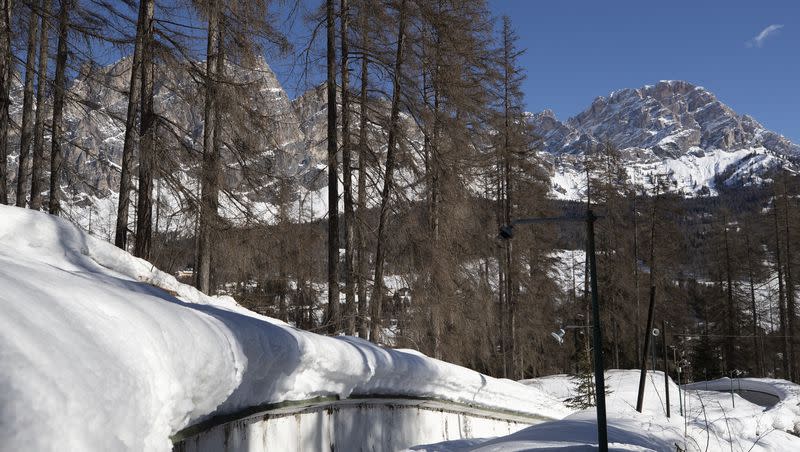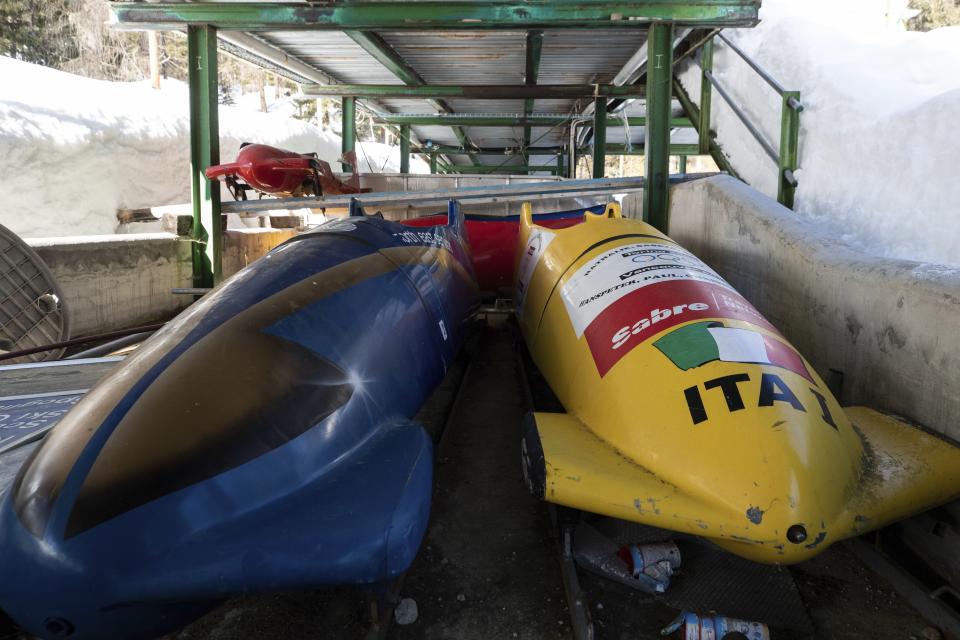Here’s why some athletes at Italy’s 2026 Winter Olympics will have to compete in another country

Bobsled, luge and skeleton competitors at the 2026 Winter Games in Milan-Cortina are going to have to compete outside of the host country because Italy has decided not to build a sliding track.
The announcement by the organizers of the next Winter Games at the International Olympic Committee session in India followed reports over the summer that there were no bids for the massive project, estimated to cost as much as $132 million.
Related
Italy wants a new bobsled track for the 2026 Winter Games. But nobody wants to build it
Here’s how much money Utah taxpayers are spending on the state’s Olympic venues
The Italian government is giving up on plans that originally called for spending some $60 million to “renew” the track built for the 1956 Winter Games in Cortina d’Ampezzo that ended up being demolished earlier this year.
“This venue has been at the center of a long and controversial process,” Giovanni Malagò, the president of the 2026 Winter Games, told IOC members Monday before spelling out that sliding events will have to be moved outside of Italy.
“As recently as two days ago the government informed us to consider the best and most sustainable option to not go ahead with the sliding center and move the sliding competition to an already existing and working venue,” Malagò said.
“As a result, Milan-Cortina 2026 has to identify another venue outside of Italy. We are already working to explore all possible solutions,” he said, citing the “dramatic international scenario” as the reason behind the government’s “reflection on the resources.”
Malagò also noted the inability to attract “construction companies capable of carrying out a complex project like the sliding center.” After receiving no bids in August, organizers had initially said they would negotiate directly with the companies to get the track built.
Now, they will have to look to existing tracks in other countries such as Austria and Switzerland, to host the events. It will be the first Winter Games spread across multiple countries, NBC Sports reported.
That’s something the IOC had pushed for even before choosing Milan-Cortina to host over a bid from Stockholm that called for holding bobsled, luge and skeleton events at an existing sliding track in Latvia.
Back in 2018, an IOC report said Italy’s bid should be considering using other European sliding tracks because the aging Italian track that was shut down in 2009 would require “major construction.”

IOC members responded positively to the news from Milan-Cortina organizers.
“This responsible commitment reinforces the position of the IOC that the construction of this venue needed to be reconsidered as the post-Games legacy plans were not clear,” Kristin Kloster Aasen, head of the IOC’s coordination commission for the 2026 Games, said.
“We welcome therefore this outcome based on Agenda 2020’s direction that no permanent venues should be built if there is not a demonstrated legacy plan for it,” the Norwegian IOC member said, referring to IOC efforts to control the Olympics’ costs and complexity.
Prince Albert of Monaco, an Olympic bobsledder who has competed in events held at the Utah Olympic Park track built near Park City for the 2002 Winter Games, also praised Milan-Cortina organizers.
“As the chairman of the IOC Sustainability and Legacy Commission, I can only applaud the decision by our friends in Milan-Cortina not to go ahead with the construction, or the reconstruction, of the sliding center,” the prince said.
“I have absolute confidence the best solution will be found for an existing venue to be the venue for those Games,” he added.
Austrian IOC member Karl Stoss offered up a solution — his country’s sliding track.
“As you know, Austria is one of the possible candidates and would be more than happy to support you on your way and in your decision, in a good neighborhood,” said Stoss, who’s over the IOC Future Host Commission for the Winter Games.
That’s the commission evaluating bids for the 2030 and 2034 Winter Games. Salt Lake City is bidding to host again in either 2030 or 2034, with a preference for the later date to avoid competing for domestic sponsors with the 2028 Summer Games.
Related
Salt Lake City was identified by Stoss as the only bidder for 2034 but also “available for 2030 if needed,” while recent bids from Sweden, Switzerland and France are in the running to host in 2030.
In India, the IOC gave a “green light” to awarding the 2030 and 2034 Winter Games at the same time and the Future Host Commission is expected to recommend within weeks which cities should advance to contract negotiations with a final vote next July.
Salt Lake City’s bid calls for no new venue construction, since the 2002 Winter Games facilities continue to be used, thanks to a legacy fund established with Olympics profits and what may add up to more than $140 million in state taxpayer funding.

